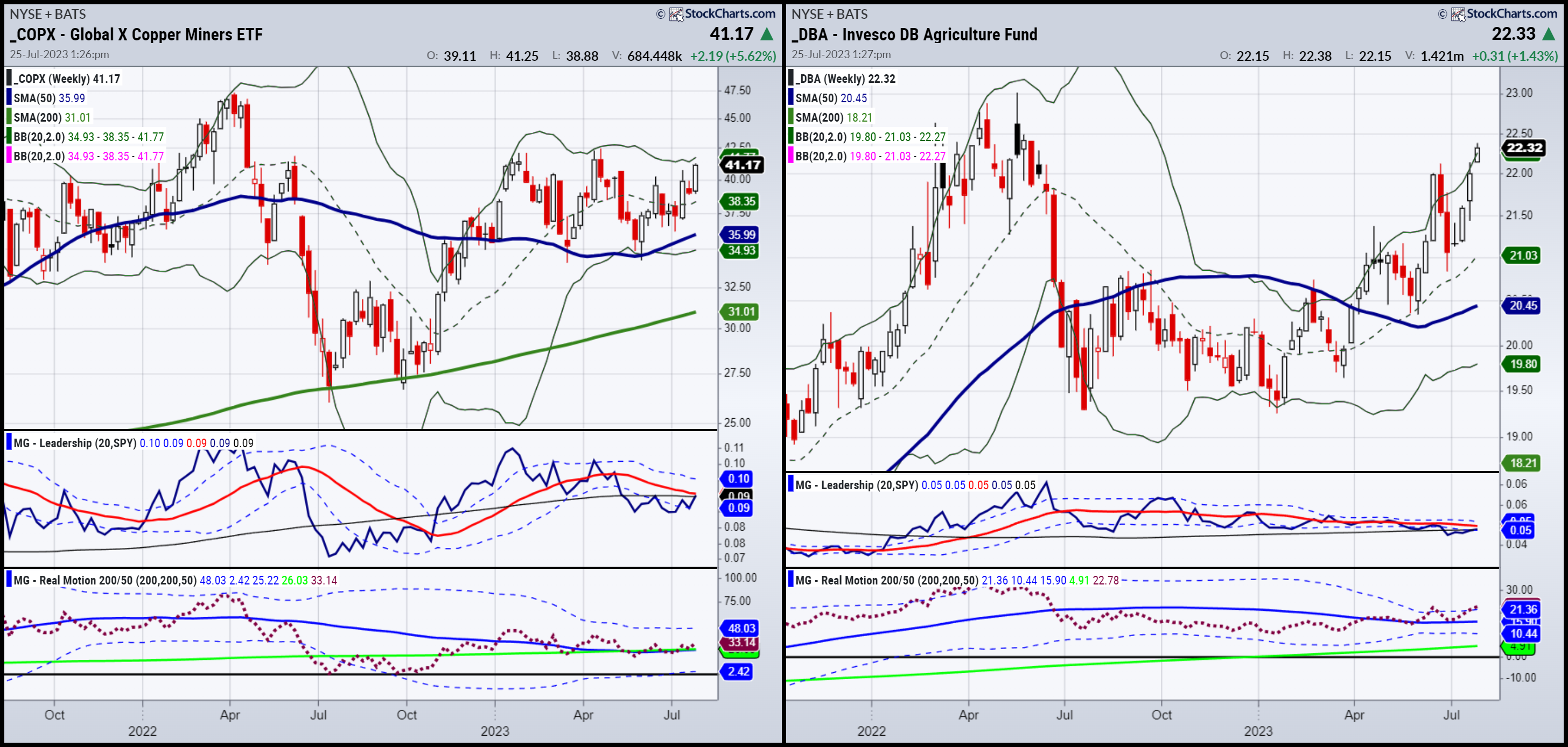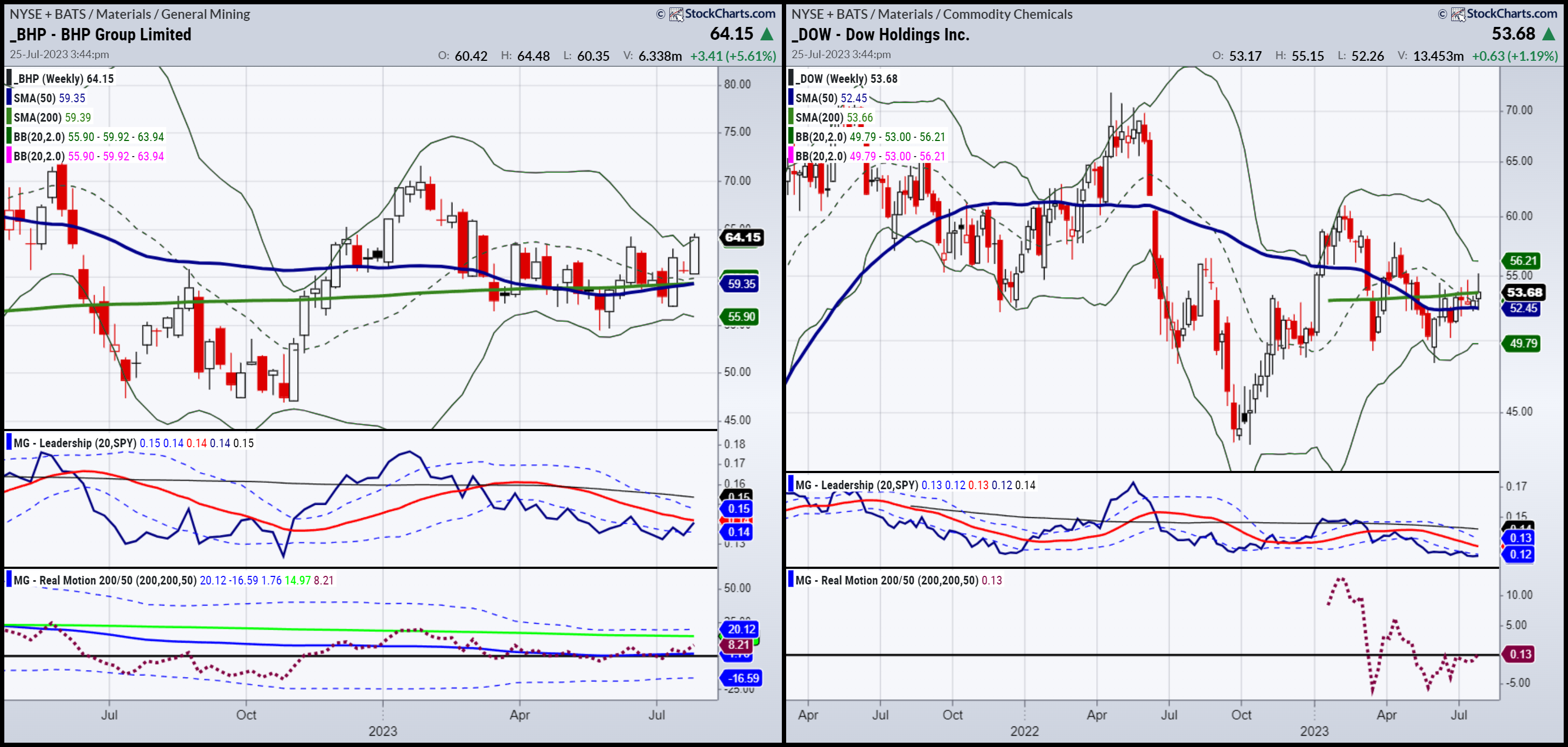For today, I used ChatGPT to ask which companies store raw materials.
After all, you cannot have capital investing in infrastructure without raw materials.
You cannot have geopolitical issues without concerns about oil and energy.
You cannot have weather issues without worrying about supply and supply chain.
How do we make stuff without stuff?
The charts are of copper through Global X Copper Miners ETF (NYSE:COPX) and agricultural soft commodities through Invesco DB Agriculture Fund (NYSE:DBA).

An interesting feature is that both are still underperforming the SPY.
Both are in bullish phases, and both have lots of upside as they are above the July 6-month calendar ranges.
Here is a list of the types of companies that store raw materials:
- Agriculture and Food Processing Companies: Companies in the agricultural and food processing sectors store raw materials such as crops, grains, fruits, vegetables, livestock, and seafood. These raw materials are used to produce various food products.
- Mining Companies: Mining companies extract raw materials such as minerals, metals, coal, and oil from the earth. These companies often have storage facilities to hold the extracted raw materials before further processing or distribution.
- Oil and Gas Companies: Companies involved in the exploration, production, and refining of oil and gas typically have storage facilities for crude oil, natural gas, and refined petroleum products.
- Warehousing and Distribution Companies: Warehouses and distribution centers play a crucial role in storing raw materials for various industries. They may handle and store a wide range of raw materials, including chemicals, textiles, electronics components, and more.
- Commodity Traders and Exchanges: Commodity traders and exchanges facilitate the trading of raw materials, including agricultural products, metals, energy resources, and other commodities. They may have storage facilities to store these materials until they are bought or sold.
- Construction Companies: Construction companies often store raw materials such as lumber, cement, bricks, steel, and other building materials at construction sites or in dedicated storage yards.
The first one we featured Monday-International Paper (NYSE:IP). At the time of writing, IP was challenging the July calendar range. Today, IP cleared up 5% on the day.
Other companies to watch are:
- Glencore (OTC:GLNCY): commodity trading and mining company that stores metals, minerals, and energy products.
- BHP Group (NYSE:BHP)-iron ore, coal, copper, nickel, and manganese.
- Amazon.com (NASDAQ:AMZN) stores a wide range of raw materials and products for various industries.
- ExxonMobil (NYSE:XOM) stores crude oil, natural gas, and refined petroleum products.
- Dow Jones Chemicals stores chemicals, plastics, and specialty materials

The charts of BHP and DOW have similar setups. Both are still underperforming the benchmark. Both have potential momentum building.
Most importantly, both look like investment opportunities if the theory of buying storehouses for raw materials makes sense to you.
ETF Summary
- S&P 500 (SPY) 452 July calendar range hi now support
- Russell 2000 (IWM) 193 is the 23-month holy grail
- Dow (DIA) 35,000 support
- Nasdaq (QQQ) Under its 6-month calendar range high, already showing signs of stress
- Regional banks (KRE) Consolidating over its July calendar highs-positive
- Semiconductors (SMH) Holds here ok-needs to clear 161 and under 147 trouble
- Transportation (IYT) Right on the July calendar range high
- Biotechnology (IBB) 128 support now to hold
- Retail (XRT) Never cleared the July calendar range high-now, 66 is key support
